#Somme Campaign
Text
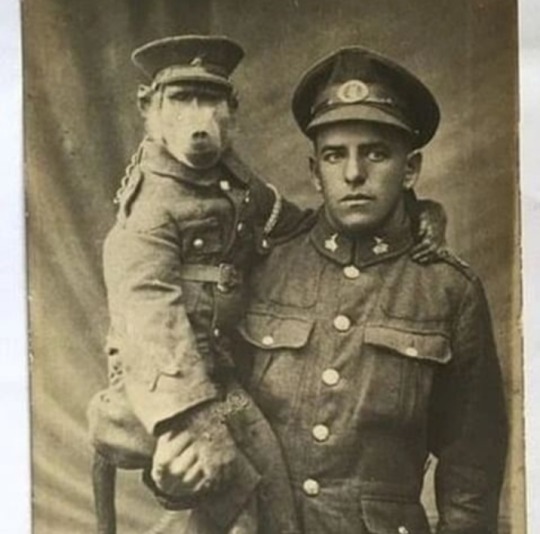

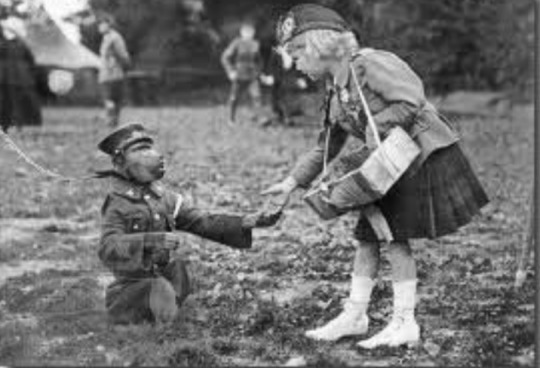
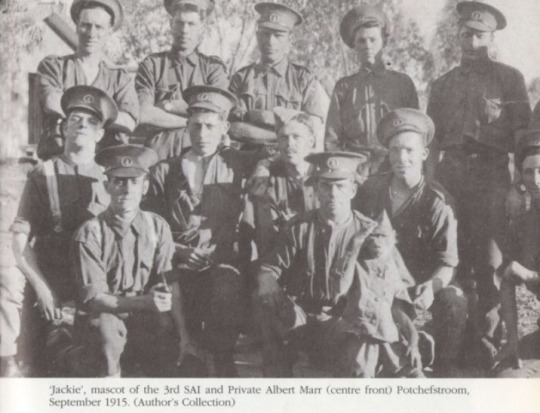
Corporal Jackie was a baboon in the South African Army during World War I.
He was the official mascot of the 3rd Transvaal Regimen when his owner Albert Marr was drafted into war and would not leave Jackie at home.
He asked his superiors if Jackie, too, could join the army and they said yes.
So Jackie was given an official style uniform with a cap, a ration set, and his own pay book.
Jackie would salute to superior officers and light soldiers' cigarettes. He would even stand at ease in the style of a trained soldier.
Due to his heightened senses, Jackie was useful to sentries on duty at night.
The baboon would be the first to know when an attack was coming or enemy soldiers were moving around nearby.
Jackie and Marr survived a battle where the casualty rate was 80%, in Delville Wood, early in the Somme Campaign.
When Marr was serving in Egypt, he was shot in the shoulder at the Battle of Agagia, 26 February 1916, while Jackie was with him, licking the wound as they awaited help.
Jackie was given his own rations while with the army and ate them with his own knife and fork, as well as his own washing basin.
When the regiment was drilled and marched, Jackie would be with them.
Jackie spent time in the trenches in France where he tried to build a wall around himself during extreme enemy fire.
However, a piece of shrapnel from an explosion flew over the wall hitting Jackie in the leg and arm.
When stretcher bearers tried to take Jackie away, he refused, desperate to finish his wall and hide.
Doctors treated Jackie's wounds, but they decided his leg had to be amputated and were surprised that he even survived.
Jackie was awarded a Medal of Valor for the event of his injuries and promoted from private to corporal.
After the war was over, Jackie was discharged with papers and went back to South Africa. He tragically died in a house fire in 1921.
#Corporal Jackie#baboon#South African Army#World War I#WWI#3rd Transvaal Regimen#Albert Marr#Battle of Agagia#Somme Campaign#animals#war hero#official mascot#Medal of Valor#South Africa
1 note
·
View note
Note
Why is there not much talk about the first world in Africa
Ya know that's a good question. There's a few reasons that make the war in Africa far less prominent than the war in Europe; scale, strategic importance and colonialism, not necessarily in that order.

Let’s start with an easy one, scale. There just weren’t that many troops fighting the war there compared to the different fronts in Europe and the Middle East. The Western and Eastern fronts packed millions of men into the trenches on either side, the Italian front had another million on each side, the Balkan theatre had another three million, the Egypt and Palestine campaign had another million, Mesopotamia was another million and the Caucasus another million.
The various European colonies in Africa were garrisoned, like most colonies of this period, by a pretty small number of total troops and an absolutely miniscule number of white, European troops. The vast majority of the soldiers fighting in these campaigns were ‘native’ troops. As an example, German East Africa, which saw the longest campaign of the war in Africa, had a population of around 7.5 million. There were around 5,000 white Germans there in total. The German army in the colony, the Schutztruppe had a strength in 1914 of about 2,700 soldiers of which only 250 where white Germans. Even counting the militia of German settler-farmers only added another 2,700 men. All of this in an area that’s three times the size of modern Germany. Total military casualties for the East Africa Campaign amounted to somewhere around the 55,000 mark (that’s killed, injured, captured and missing), fewer than British casualties on the first day of the Battle of the Somme.
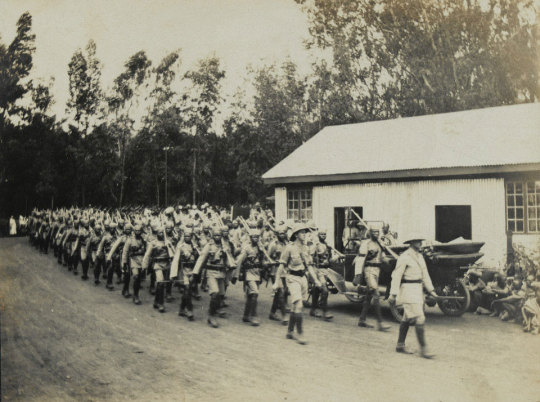
The other African campaigns were even smaller in scope, with total forces on each side often numbering in the hundreds or low thousands, and were usually over by 1916. Germany knew they’d likely lose their colonies, but hoped to recoup the loss in the post-war settlement when (if) they won. They colonies in Africa just weren’t vital to Germany, which brings us to our next point, strategic importance.
Germany’s geographic position meant that as soon as war was declared they were essentially cut off from their colonies (although there was a failed attempt to resupply the Schutztruppe in East Africa by airship in 1917 https://en.wikipedia.org/wiki/LZ_104_(L_59) ). The British and French navies dominated the seas and there was little Germany could do. But, by the same token, the loss of these colonies wasn’t a big blow to the German war effort. Germany’s strength was in Europe, and most of its basic needs could be met from resources within Germany or the territories it conquered. Beating a few thousand German troops in East Africa wasn’t going to bring down the German government or make the German army collapse. There were local and imperial reasons to wage these campaigns, and wage them the British, French, Portuguese and Belgians did. But they were never the main, or even a secondary effort, they were very much an afterthought. And this brings us neatly to the last point, colonialism.
Now, the above refers to military numbers and casualties, and as usual in war, it’s civilians who actually suffer the most. Taking the East Africa Campaign again. Each of the armies fighting there conscripted huge numbers of ‘porters’, local civilians who carried the equipment and supplies. One historian assessed the British effort as “recruiting” 1 million civilian porters. 95,000 of them died during the war. A further 15,000 porters in Belgian service died, 7,000 porters in German service died as did an unknown number of civilian porters in Portuguese service, but it’s likely in the low tens of thousands. An official from the British Colonial Office wrote that the East African campaign had not become a scandal only "... because the people who suffered most were the carriers - and after all, who cares about native carriers?"

The war the European armies fought in Africa was mobile, and far from stable and secure supply lines. As such, the armies often “lived off the land”, which is a nice way of saying they looted and pillaged everything in their path to keep themselves fed and supplied. The German army was probably more ruthless in its pillaging, but that’s largely because they were cut off from any support base and waging a guerilla war. Looting like this had dire consequences for locals and famine spread in the war’s wake. Modern estimates are in the range of 750,000 civilian deaths in Africa from the war, although this is probably a conservative count. About half of these deaths, some 350,000, were in German East Africa. Ludwig Deppe, a German doctor who participated in the East Africa Campaign compared the devastation caused by German forces:
“Behind us we leave destroyed fields, ransacked magazines and for the immediate future, starvation. We are no longer agents of culture, our track is marked by death, plundering and evacuated villages, just like the progress of our own enemies in the Thirty Years War.”
None of the war in Africa painted the European empires in a particularly flattering light and it was pretty easy for them to if not cover it up, at least to deflect attention. The butchery in Europe was on a different scale and much closer to home. The Western Front came to dominate memory of the war for the basic reason that it was in France and Belgium that most of the troops fought and died, and it was on the Western Front that Germany was defeated. It was hard enough to fit sideshows like Italy, Salonika and even Palestine into a narrative of the war, let alone the colonial campaigns in Africa.
62 notes
·
View notes
Text

CHF15/CHF2,000
This campaign was started back in February by @/sillage_association.ch and has only received CHF 15.
The campaign will be benefiting Malaika, a grassroots initiative in Kalebuka in southeastern DRC. Malaika helps provide free primary and secondary education to 400+ girls, a Community Center that serves over 5,000 youths and adults, and clean water and other health projects to the community.
You can also donate through Malaika's website if you prefer.
#Democratic Republic of the Congo#drc#dr congo#Congo is bleeding#free congo#congo genocide#goma#m23 rebels
25 notes
·
View notes
Text
Schofield’s Wound Stripe

“Blake heaves him to his feet - his uniform is identical to Blake’s, same rank, the only difference is the brass wound stripe on Schofield’s left sleeve.“
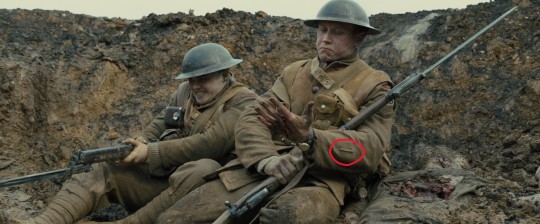
“A wound stripe is a distinction of dress bestowed on soldiers wounded in combat. It was typically worn on military uniform jackets.”

“The award of a stripe to soldiers who had been wounded during the war was authorized by Army Order 249 of 6 July 1916. This order allowed those who had appeared in a War Office casualty list to sew a two-inch stripe of gold Russia braid onto the left sleeve of their service jacket.”
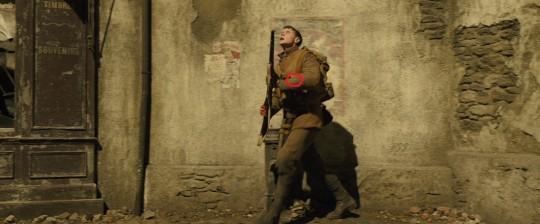
“Officers and men reported ‘wounded – gas,’ or ‘Wounded – shock, shell,’ are entitled to the [WOUND STRIPE].“
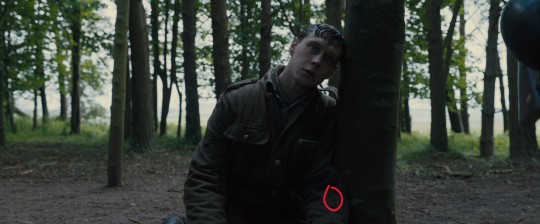
BLAKE: Was it like this before Thiepval?
The name does something to Schofield. Fear clings to him. He pushes it away.
SCHOFIELD: I don’t remember.
BLAKE: You don’t remember the Somme?
SCHOFIELD: Not really.
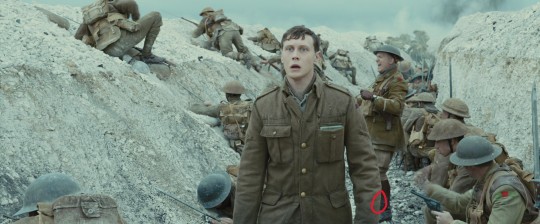
“In August 1916, coincidentally a month after the massacres on the battlefields of the Somme, the British Army began issuing wound stripes to Allied Soldiers and Officers who had been wounded in combat or campaigns since 4th August 1914″
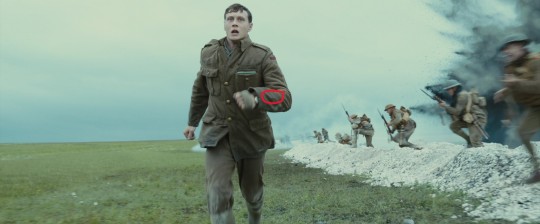
#surely no one cares enough about this movie to do this#like only I am delusional enough to want to highlight a small costume detail lol#that being said I did write that one fic about it so#1917#1917 (2019)#1917 movie#1917 film#will schofield#william schofield#lance corporal schofield#schofield#Sam Mendes#krysty wilson-cairns#ig I'll tag them since they wrote it lol#mine
598 notes
·
View notes
Text
I don't want to die...

Oh, Thomas...
You have no idea what you're in for, do you?
⫘⫘⫘⫘⫘⫘⫘⫘⫘⫘
Since apparently having WWI OCS isn't as uncommon as I thought, I figured I'd start posting about my own.
His name is Thomas, a 19-year-old British infantry soldier. He's for my friend's Never Going Home campaign and doubles as something of a vent OC. For context, NGH is a TTRPG set in an alternate reality of WWI where the Veil is broken and Eldritch monsters begin flooding into and further fucking up the war.
Thomas wanted to be an artist, but signed up to join the British army just after the Battle of the Somme, which caused a higher demand for soldiers due to the losses... and the awful things that were finding their way into human reality.
He thought he was going to be a hero. He thought he'd be able to return home to his proud parents when the war was over.
He was wrong.
So wrong.
This war isn't ending, and the horrific changes he undergoes will render him unable to ever return to his life before all hell broke loose. He is never going home.
It's a good thing he's resourceful.
⫘⫘⫘⫘⫘⫘⫘⫘⫘⫘
#ww1 fiction#wwi oc#oc sketch#Never Going Home TTRPG#ttrpg character#I'll post more about him don't worry#I'm gonna fuck this kid up so bad
2 notes
·
View notes
Text

1917 04 11 Letord over the Chemin des Dames - Graham Turner
repost bigger size
Letord of the French C 11 Observation Squadron directs artillery fire onto the rear of the German lines east of Rheims on 11th April 1917, prior to the ground offensive.The Letord is piloted by Cpt Joseph Vuillemin, who commanded the C 11 Observation Squadron through the campaigns at Verdun and the Somme. A former NCO, he was commissioned as an artillery officer in 1910 and became a pilot in 1913, specialising in aerial spotting. In the 1916 and 1917 campaigns he flew more than 100 combat missions in support of the army. During his career as an observation pilot he is also credited with shooting down seven German aircraft.
13 notes
·
View notes
Text
Les Trois Mousquetaires, Chapter 28
After the insanity and darkness of the last chapter, this one provides some badly needed comic relief.
D'Artagnan tries to question a now less drunk Athos further on his confession, but Athos has closed up again.
While d'Art leaves him be, Athos makes the unwise decision to play dice with a few other guests of the inn. In a hilarious and inebriated back-and-forth of winning and losing, Athos gambles away both of their shiny new English horses, their harnesses and Grimaud (divided into ten parts) and - briefly - the exasperated d'Artagnan's diamond ring, eventually leaving them with 100 pistoles and two saddles (and d'Art's diamond), but no horses at all. (It's fine; they'll take their servants' horses. Servants don't mind walking, while carrying saddles on their backs...)

En route back to Paris, they pick up Aramis who, comtemplating the fleetingness of all things in life (including horses), has sold his horse for a ridiculously low price .
Together, they leave to pick up Porthos whom they find having a fine meal (which turns out to be - hold on to your stomachs, fellow-vegetarians and animal rights defenders - made of horse meat.) Yes, Porthos as well has sold his horse. But at least - unlike the others - he's still got the precious bridle and thus, like Athos remarks, made the best bargain of them all.
We may not find this funny, but our Musketeer boys do. A round of hearty laughter ensues. And Aramis fittingly remarks:
"Ma foi, nous nous valons tous: on direait que nous nous sommes donné le mot."
(Dear me, one of us is as good as the other. One might assume we've coordinated.)
Of course they have, mes ami(e)s. They share the same brain cell.

And although Athos had to buy an exquisite bottle of wine, Aramis had to donate to the church and Porthos had to pay the doctor to treat Mousqueton's bullet wound (in his derrière, as you may remember) they have 400 livres left to cover their basic needs and are very happy with themselves.
Back in Paris, d'Artagnan receives a letter from Monsieur des Essarts that he's supposed to go on a military campaign and needs to attain proper equipment. The others have received similar letters from Tréville and, doing the math, arrive at the conclusion that they will each need 1.500 livres to equip themselves. And all they have are saddles (and one bridle).
Which brings it all back to the diamond ring on d'Artagnan's finger....
#les trois mousquetaires#alexandre dumas#the three musketeers#chapter 28#reread#my reading#athos#porthos#aramis#d'artagnan
13 notes
·
View notes
Text
“This week, Suella Braverman has undermined the operational independence of the police, angered politicians and communities on all sides in Northern Ireland, stoked the potential for unrest caused by the far right and antisemites at tomorrow’s pro-Palestinian march, earned a rebuke from Winston Churchill’s grandson, and so much more besides – and all out of sheer respect for the dead we commemorate this weekend and every Armistice Day. If you could take a time machine back to the Somme, and keep some poor teenager company as he bled out in the mud, you could explain to him the honour of the chance to one day have one’s memory co-opted in this selfless way. Dulce et Decorum Est to die for the future opportunity to be used as a news peg in Suella’s leadership campaign.”
2 notes
·
View notes
Text
Black Blade Aldwin
This was a ballad I wrote for a creative assignment. The entire piece is in tetrameter-trimeter, so each pair of lines is 4 beats followed by 3 beats.
One merry morning midsummer’s day
A fleet doth dock in landing
For King Edward’s great French campaign
Had come to a beginning.
The bright July sky-beacon shown
The port of which they met
The great men of Saint Vaast la Hogue
Who would see no sun set.
Bretons, Germans, Welsh, English,
Did Edward send to fight
Did take the port-town those great men
Who fought until the night.
What anger seethed under his skin?
What upset that great lord?
King Edward wanted Gascony
To stay upon his board.
And so he marched his many mounts
Down South into French ground,
And on he marched towards River Seine
To sack a lovely town.
From town to town they came and went
And burned down every home,
For Edward wanted Gascony
To keep an English throne.
In Caen they burned and drank and stole
And ate their own good fill,
They all indulged save one good man
Who not had the same will.
He stayed and watched from a distance
With disdain in his heart,
This Black Blade soldier, his good soul
Denied that he take part.
That great sword, Aldwin, held his hilt
He looked over the town,
And as the smoke poured into night
Could not he but look down.
“Not ye want to take your fill
Do not ye want indulge?”
Asked one soldier unto the Blade
So did the Blade divulge:
“I take no part, this vile game
Does not entice my soul.
Had I stolen and drunk my fill
My heart be not but coal.”
The soldiers sacked Caen for five days
Yet not did Aldwin once,
He led the capture of the town
Yet not he led the hunts.
The first of August did depart
King Edward’s many blades,
And leading the front of the march
The great Aldwin’s brigade.
Across the Rivers Seine and Somme
The English fought their way,
For they needed to feed themselves
And North they made their way.
Black Blade Aldwin led the charge
That broke the French’s line,
He was no knight nor man-at-arms
Yet still he spilled blood-brine.
Further North outside Wissant
As night blazed into day,
King Edward held a council meet
Which chose to take Calais.
“Hark here my good kin, listen close,
For we have decided.”
The great King spoke, his men agreed,
No opinions divided.
“We’ll siege their gates and block their ports
Deny them any goods,
We’ll cut off all their food and drink
Deprive them of their woods.”
And so as the leaves fell from high
And changed from green to brown,
Great Edward sent his hefty men
To rupture Calais’ ground.
The men-at-arms and cavalry
Went charging at the gate,
Yet Black Blade Aldwin led no charge,
He chose to lie in wait.
Calais’ walls were heavy wrought
With moats and marshy swamps,
The charging forces stood no chance,
Their boots no place to stomp.
So settled then did King Edward
A settled camp he built,
Dubbed Nouville did the English stay
Till’ Calais’ red had spilt.
Yet Edward came and bade of him
That fabled blackened Blade,
He asked for Aldwin’s swordsmanship
Under his small tent’s shade.
“Aldwin I come to ask of you
To lead one final line.
I wish to break Calais’ thick gate,
That great door’s armored pine.”
Aldwin sat and rest his helm
Upon his leathered knee,
He thought about it long and hard
A decision made he.
“Great Edward, sir, I will oblige,
I’ll take your final run,
But do not expect blackened blades
To glisten in the sun.
I honor thee with my own soul,
I offer it to you,
For loyalty to my great land,
I’ll birth my blade anew.”
And so he led his men in front,
He tamed that wild crew,
He manned Edward’s tough men-at-arms
And led them through cold blue.
Through water, mud, and embankments
He marched his plate and steel,
He led the knights and cavalry
To Calais’ wooden seal.
Aldwin came upon the gate
That blocked his return home,
To take down this final defense
He’d sacrifice his bone.
Unleashed upon great Edward’s men
Calais fired its volley,
And out came iron pike-bearers
Who led Aldwin to folly.
Fight hard to breach the walls did he,
Did Aldwin wish to fight,
Yet to the ground his left hand fell,
Sliced by a nasty pike.
The English slayed those pike-bearers,
And fended from the arrows,
Yet before they could make their way,
Calais’ entrance had narrowed.
Much longer did the English wait,
Yet not could they shed blood,
They kept trapped the town of Calais,
Encased in bloodied mud.
‘Twas a rough day for Englishmen
For a defeat they felt,
Still not could they breach those thick walls
Yet further, Aldwin knelt.
No longer could he join the fray,
No longer his sword swung,
That Black Blade soldier, now a knight,
Was sent to see his young.
He returned to his English town,
Far sent from his short home,
Yet the battle still followed him,
And came for his land’s throne.
King Philip wished to save his folk
And act as such did he,
He called upon those noble Scots
To venge that land of thee.
And so the Scots, noble in deed,
Did they choose to comply,
At Neville’s Cross King David came
To light ablaze the sky.
The English had very few men
To protect their homeland,
Yet outnumbered ‘round two to one,
Ralph Neville did command.
He led those men of Edward’s kin,
Struck Scots from far and wide,
And of those men who Ralph had led,
The Blackened Blade did ride.
Although he only had his right,
His left did still do work,
For a plate shield mounted his wrist,
Under a blade doth lurk.
Upon his hilt, that blackened blade,
As wrought as it was born,
He entered for the final time,
A battlefield long torn.
For countrymen and kinsmanship,
Aldwin chose to protect,
The slaying of his families
A concept he’d reject.
For country, honor, and the crown,
Aldwin did dedicate,
For just a man he truly was,
Yet death he’d aggravate.
For long did he with scratch and wound,
Continue on his steed,
Until the final Scotsmen fell
And David’s push would heed.
A sad day for the Englishmen,
Again did the skies gray,
For no longer did Aldwin breathe,
Nor live another day.
The next midsummer did arrive,
One morning they did go,
His family sought to honor him,
And flowers did they grow.
They took them to his burial
And laid them on his grave,
Then came a many men for him
They wished to do the same.
For honor, glory, rectitude,
For kinsmen and for young,
The great Black Blade gave up his life,
Brought silence to his tongue.
For honor, glory, rectitude,
For family with no strife,
Great Black Blade Aldwin gave himself
For his young’s gentle life.
8 notes
·
View notes
Text
hey!! ty @swimmingleo for the tag <3 here's what i've been up to recently
last song:
i've been rediscovering their discography with them being on tour and Wilbur playing on the qsmp on twitch
last photo i took: somewhere in the Baie de Somme in France

currently watching: just finished Heartstopper s2 and trying to keep up with Critical Role's third campaign, Bells Hells
next watching: i think i'm gonna finally start Succession
currently reading: while outlining an article about a new creature for a dnd campaign i needed to do some research. next thing i know, i'm right in the middle of reading a whole 110 pages veterinarian thesis about the anatomy and social behaviours of lions, so i guess that's my current read
next reading: looking forward to start reading the monster that is The Priory of the Orange Tree by Samantha Shannon
current obsession: i guess the qsmp story line. i spend way too much time on twitch watching this bunch of idiots taking care of some minecraft pixelated eggs
alright, tagging @walkinginsunflowers @stylesrainbows and @bigxrig
2 notes
·
View notes
Text
Events 8.21 (after 1900)
1901 – Six hundred American school teachers, Thomasites, arrived in Manila on the USAT Thomas.
1911 – The Mona Lisa is stolen by Vincenzo Peruggia, a Louvre employee.
1914 – World War I: The Battle of Charleroi, a successful German attack across the River Sambre that pre-empted a French offensive in the same area.
1918 – World War I: The Second Battle of the Somme begins.
1942 – World War II: The Guadalcanal Campaign: American forces defeat an attack by Imperial Japanese Army soldiers in the Battle of the Tenaru.
1944 – Dumbarton Oaks Conference, prelude to the United Nations, begins.
1944 – World War II: Canadian and Polish units capture the strategically important town of Falaise, Calvados, France.
1945 – Physicist Harry Daghlian is fatally irradiated in a criticality accident during an experiment with the Demon core at Los Alamos National Laboratory.
1957 – The Soviet Union successfully conducts a long-range test flight of the R-7 Semyorka, the first intercontinental ballistic missile.
1959 – United States President Dwight D. Eisenhower signs an executive order proclaiming Hawaii the 50th state of the union. Hawaii's admission is currently commemorated by Hawaii Admission Day.
1963 – Xá Lợi Pagoda raids: The Army of the Republic of Vietnam Special Forces loyal to Ngô Đình Nhu, brother of President Ngo Dinh Diem, vandalizes Buddhist pagodas across the country, arresting thousands and leaving an estimated hundreds dead.
1965 – The Socialist Republic of Romania is proclaimed, following the adoption of a new constitution.
1968 – Cold War: Nicolae Ceaușescu, leader of the Socialist Republic of Romania, publicly condemns the Soviet-led Warsaw Pact invasion of Czechoslovakia, encouraging the Romanian population to arm itself against possible Soviet reprisals.
1968 – James Anderson Jr. posthumously receives the first Medal of Honor to be awarded to an African American U.S. Marine.
1971 – A bomb exploded in the Liberal Party campaign rally in Plaza Miranda, Manila, Philippines with several anti-Marcos political candidates injured.
1982 – Lebanese Civil War: The first troops of a multinational force lands in Beirut to oversee the Palestine Liberation Organization's withdrawal from Lebanon.
1983 – Philippine opposition leader Benigno Aquino Jr. is assassinated at Manila International Airport (now renamed Ninoy Aquino International Airport in his honor).
1986 – Carbon dioxide gas erupts from volcanic Lake Nyos in Cameroon, killing up to 1,800 people within a 20-kilometre (12 mi) range.
1988 – The 6.9 Mw Nepal earthquake shakes the Nepal–India border with a maximum Mercalli intensity of VIII (Severe), leaving 709–1,450 people killed and thousands injured.
1991 – Latvia declares renewal of its full independence after its occupation by the Soviet Union since 1940.
1991 – Coup attempt against Mikhail Gorbachev collapses.
1993 – NASA loses contact with the Mars Observer spacecraft.
1994 – Royal Air Maroc Flight 630 crashes in Douar Izounine, Morocco, killing all 44 people on board.
1995 – Atlantic Southeast Airlines Flight 529, an Embraer EMB 120 Brasilia, attempts to divert to West Georgia Regional Airport after the left engine fails, but the aircraft crashes in Carroll County near Carrollton, Georgia, killing nine of the 29 people on board.
2000 – American golfer Tiger Woods wins the 82nd PGA Championship and becomes the first golfer since Ben Hogan in 1953 to win three majors in a calendar year.
2013 – Hundreds of people are reported killed by chemical attacks in the Ghouta region of Syria.
2017 – A solar eclipse traverses the continental United States.
2 notes
·
View notes
Text
26 June 2023
The End of the Beginning
Gallipoli
26 June 2023
In the end, it was not the great and distinguished generals like Hamilton, Birdwood or Hunter-Weston that planned the final withdrawal from Gallipoli. The failure of the August Offensive was the last nail in the coffin for Hamilton’s career, and he was removed shortly after. Hunter-Weston had been invalidated in the midsummer (although he would be inflicted upon the army again at the Somme), and Stopford had been quietly returned to retirement. General Munro, Hamilton’s unromantic successor, and Lord Kitchener, who had visited the Peninsula shortly after the August debacle, had decided to pull the plug. Now came the task of getting out.
Birdwood remained, of course, but the evacuation of Anzac was not his brainchild. It was Colonel Brudenell White, his chief staff officer, who largely planned it. One of the great ironies of Gallipoli is that the only time thoughtful and considered planning and staffwork was properly done was at the very end. Under White, and his IX Corps counterpart at Suvla whose name unfortunately escapes me right now, men, stores and weapons were quietly lifted from the peninsula, until at last the final men left before dawn on the 20th of December. The evacuations of Anzac and Suvla were completed with nearly no casualties. There’s some spectualtion today as to whether or not the Ottomans simply allowed the Allies to go. I’m not convinced of this - Kemal in particular was not the kind of man to let thousands of Allied troops, many of whom would go on to fight the Ottoman Empire else where, simply slip away into the night.
Helles would be maintained until 21 January 1916, but eventually it too was quietly and successfully evacuated. The last man to leave was General Stanley Maude, who would go on to die of cholera in the Mesopotamia campaign. The second last man to go was Major Clement Attlee. ‘Major Attlee,’ as he was called between the wars, would go on to become a Labour Prime Minister, defeating Churchill in 1945.

Our time at Anzac today was brief. We first headed to Green Hill Cemetary, which was about as far into the Suvla sector as our bus could go. Unlike Anzac, which was officially ceded to the Australian government - yes, that’s true, although we don’t claim sovereignty now we do technically own the land - Suvla remained Turkish territory after the war. The cemetaries there are necessarily consolidated. This also meant that the Imperial War Graves Commission, rather than sticking to battlefield positions, were able to create more traditional cemeteries here. Green Hill, whose layout somewhat sneakily resembles a cross, therefore looks a lot like the cemeteries I’ve seen in France, Belgium and the Netherlands.
It is also here that, even amongst the myriad tragedies of Gallipoli, a particularly wasted life stands out. Private Harry Salter, 6th East Lancashires, was aged 19 at Suvla, though he clearly lied about his age as his grave says he was 24. Salter was charged - and this is related in an account by Private Edward Roe - with taking ‘French leave,’ leaving his sector to go to Anzac. He was found guilty of desertion - even though Roe points out that desertion at Gallipoli was impossible, every square inch of land being under threat of Turkish fire. On the 11th of December, ten days before the end of the campaign, he was taken to an abandoned quarry in the Suvla sector and shot.
‘I only wish,’ Roe writes, ‘that the distinguished person who signed the death warrent without taking into consideration the extenuating circumstances would leave his comfortable island residence and visit the men under his command who were going through it.’ Roe was one of the firing party.

We proceeded to the Anzac Commemorative Area on North Beach, our last stop on Gallipoli. This was created in 2000 and there’s a plaque with the names of the then Australian and New Zealand Prime Ministers - this means, quite outrageously, that the only names enshrined here are those of John Howard and Helen Clark. All leaders use the past, but Old John is particularly infamous among historians for weaponising it in the so-called ‘History Wars.’ There is something obscene about his name being here. Then again, the ‘memorial’ here is very much out of the Howard-Nelson playbook. There are deeply sanitized placards that minimize nearly everyone who wasn’t Australian or New Zealander. The British get a few terse mentions, mostly in the context of failure, the Indians get one token mention, and the Gurkhas and Newfoundlanders are totally out of luck.
It’s here that commemorative events are held every 25th of April at dawn. For most people who attend, I’m sure, it’s a beautiful and moving experience, but the diginitaries - the Prime Ministers, ambassadors and all those ‘great and good’ - do not stay here. They ride in on buses and cars before dawn, and they ride straight back out when it’s done. Apart from maybe the Prime Ministers, they don’t visit the graves, nor do they contemplate the site. This is just part of the diplomatic calander, a nice little gesture between Canberra and Istanbul (or Wellington and Istanbul) to smooth the passing of treaties or trade deals. They just have to be quiet for one minute and look like they’re thinking of one war, and then they can go back to planning the next.

People should come to Gallipoli, and not just Australians, New Zealanders or Turks. But they shouldn’t come here for that great ceremony - they should come now, or in August, or even in the winter when the landscape is covered in ice and snow. They should explore it themselves - go to the cemetaries, not just ours but everybodies, and gaze upon those names. Walk the ground. Trace the landscape. Gaze into the sea and think of the ships that still rest there. Come up with your own conclusions about it. Don’t take what the AWM or the Turkish Government or anyone else - including me, for that matter - as gospel.
Was it all a waste? Was it sacrifice? Heroism? Crime? I can’t tell you that. Go to Plugge’s Plateau, or V Beach, or Chunuk Bair - look out over the landscape, and there you will receive the answer.
Of course, this is true of any battlefield. They all say different things, and they say them to different people. Gallipoli and Normandy were both amphibious operations, but one screamed to me about pointless, idiotic waste, and the other spoke solemly of the suffering needed to put an end to perhaps the most awful regime in history. They may say something else to others.
(This is all metaphorical by the way. I am not actually hearing the ground talking to me. I’m not that mad.)
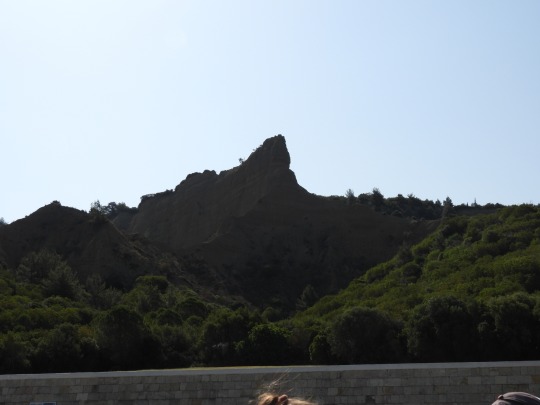
This brought my Gallipoli adventure to a close. The others went on a boat to snorkel over a wrecked landing barge, but I saw that boat while we were at North Beach and I decided that discretion was the better part of valour and stayed back at the hotel in air-conditioned comfort. We leave Turkey tomorrow, and I’ll miss it more than I expected, but I’ll also be very glad for the change of scenary.
For you see, the story didn’t end at Gallipoli - in fact, Gallipoli was in many ways a spin-off of the main tale. For as much as the British government wished it wasn’t, the war was only going to be won or lost in one place. The men at Gallipoli had departed hell, but they were now bound for the Western Front…
2 notes
·
View notes
Photo
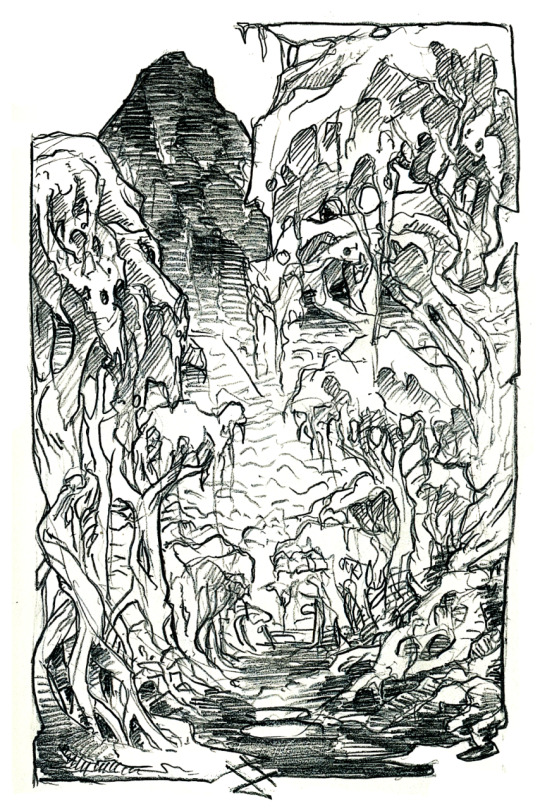
Mountain of the Black Wind
We hear the drums echoing tonight
We speaks only whispers to avoid detection
It's coming in, on July 21th 1925
Its moonlit wings reflect those stars that guide towards annihilation
We stops at the entrance near the top
Hoping to find some old forgotten clue to stop this blasphemy
It turned to us as if to say
"Hurry, boy, my son's waiting there for you"
[Chorus]
You're gonna take a lot from us and drag us up to you
There's nothing that ten thousand men or more could ever do
I curse the coming of your offspring tonight
Gonna see the Bloody tong take offerings on the Mountain of the Black Wind (Ooh)
/* Pencil doodle on A6 sketchbook - Porte-mine sur carnet A6 */
/* Parody of Africa by Toto (c) Jeff Porcaro & David Paich */
/* Masks of Nyarlathotep is a Chaosium RPG campaign for Call of Cthulhu designed by Larry DiTillio Lynn Willis */
/* I'm sorry */
Au loin les tambours résonnent fortement ce soir
Nous ne parlons qu'en chuchotant pour ne pas être repérés
Il arrive, en ce 21 juillet 1925.
Ses ailes éclairées de lune reflètent ces étoiles qui nous guident vers le néant
Nous sommes près de l'entrée secrete du sommet
espérant trouver un indice oublié pour empêcher ce blasphème.
Il s'est tourné vers nous comme s'il disait
"Dépêche-toi, mon garçon, mon fils t'attend là-bas".
[Chorus]
Tu vas nous prendre beaucoup et nous traîner jusqu'à toi
Il n'y a rien que dix mille hommes ou plus ne puissent faire.
Je maudis l'arrivée de ta progéniture ce soir.
Ce soir la langue Sanglante accepte les offrandes sur la Montagne du Vent Noir (Ooh).
#rpg#blackwind#mountain#nyarlathotep#Cthulhu#Chaosium#kenya#toto#callofcthulhu#masks of nyarlathotep
10 notes
·
View notes
Text
The British bombing campaigns during World War I were relatively limited compared to the more devastating aerial campaigns of World War II. However, the Royal Flying Corps (RFC) and the Royal Naval Air Service (RNAS) — which later merged to form the Royal Air Force (RAF) in 1918 — conducted various bombing missions targeting military installations, infrastructure, and industrial facilities of the Central Powers, primarily Germany.
Here is a list of the notable British bombing campaigns in World War I, along with key details:
---
### 1. **Early Bombing Raids by the Royal Naval Air Service (RNAS)**
**Timeframe**: 1914-1915
**Details**:
- The RNAS conducted some of the earliest bombing raids against German positions. These missions were usually flown by small, unarmed aircraft or seaplanes that were primarily intended for reconnaissance.
- The RNAS was tasked with attacking naval facilities, Zeppelin bases, and airship sheds, particularly along the Belgian coast and in northern Germany.
- Notable early raids include the bombing of **Cuxhaven** on Christmas Day in 1914, where seaplanes attempted to bomb German Zeppelin sheds, although with limited success.
---
### 2. **Zeppelin and German Naval Base Bombings**
**Timeframe**: 1915-1917
**Details**:
- The RNAS targeted **Zeppelin airship bases** in **Germany** and **occupied Belgium** to prevent German airship raids on Britain.
- **Bombing of Düsseldorf and Friedrichshafen (1914)**: Early bombing raids were launched against German Zeppelin bases in Düsseldorf and Friedrichshafen. These raids were largely symbolic as they caused limited damage, but they demonstrated the potential of air power.
- **Zeebrugge (Belgium)**: The bombing of Zeebrugge, a key German submarine base in occupied Belgium, was a major focus. Several raids targeted the docks and naval facilities, attempting to disrupt U-boat operations.
- Despite limited aircraft range and bomb load, these missions were strategically significant in disrupting Zeppelin operations and naval infrastructure.
---
### 3. **Strategic Bombing by the Royal Flying Corps**
**Timeframe**: 1916-1918
**Details**:
- As aircraft technology advanced, the **Royal Flying Corps (RFC)** shifted from reconnaissance and tactical support roles to strategic bombing.
- The RFC began targeting industrial sites, railways, and supply depots in Germany and the occupied territories to hinder the German war effort.
- **The Somme Offensive (1916)**: During the Battle of the Somme, the RFC conducted bombing missions against German positions behind the lines, including supply depots and railheads. The bombings were not highly effective due to limitations in bomb-carrying capacity and the inaccuracy of early bombsights.
---
### 4. **Formation of the Royal Air Force (RAF)**
**Timeframe**: April 1, 1918
**Details**:
- The **Royal Air Force (RAF)** was created in April 1918, the world’s first independent air force. This merger of the RFC and RNAS allowed for more coordinated bombing operations.
- The RAF initiated **long-range bombing missions** against German industrial targets in the Rhineland, especially in the final months of the war.
- Bombing raids intensified on key German industrial sites, including factories, railways, and military installations.
- **Strategic Bombing of Saarbrücken**: One of the RAF's significant operations was the bombing of **Saarbrücken** in October 1918, a German industrial center.
---
### 5. **Independent Air Force (IAF)**
**Timeframe**: 1918
**Details**:
- In **June 1918**, the British formed the **Independent Air Force (IAF)** under **General Hugh Trenchard**, tasked specifically with conducting strategic bombing deep into German territory.
- The IAF operated independently of the army and navy, focusing on disrupting German war production, communications, and infrastructure.
- Targets included **steel plants, railways, munitions factories**, and **supply depots** in German cities such as **Cologne, Frankfurt, Mannheim, and Essen**.
- The IAF’s raids were hindered by poor weather and the limited bomb load and range of British aircraft, but the psychological impact on the German populace and military was notable.
---
### 6. **Night Bombing Campaigns**
**Timeframe**: 1917-1918
**Details**:
- To minimize the risk of losses from German anti-aircraft fire, the British increasingly switched to **night bombing missions**. These raids were less accurate but offered more protection to pilots.
- Night raids focused on German industrial centers, particularly **the Ruhr Valley**, which was a key area for German war production.
- Bombing during nighttime required improved navigational techniques, but the technology of the time made it difficult to achieve significant results.
---
### 7. **Bomber Aircraft and Development**
**Key Aircraft**:
- **Handley Page Type O Bomber**: One of the most notable British bombers of WWI, the **Handley Page O/100** and **O/400** were large twin-engine bombers used for long-range missions. They carried a maximum bomb load of around 1,650 pounds (750 kg) and were employed in strategic bombing raids late in the war.
- **Airco DH.4**: The DH.4 was a two-seat bomber and reconnaissance aircraft used for day bombing missions. It was one of the most successful British bombers, fast and well-armed.
---
### **Outcome and Impact of British Bombing Campaigns**
- **Limited Strategic Impact**: The strategic bombing campaigns of World War I had limited physical effects due to the small bomb loads, limited range, and inaccuracy of early aircraft. Bombing raids often caused minor damage to industrial targets and railways, and many missions were canceled due to weather conditions or technical failures.
- **Psychological Effect**: While the material damage was often minimal, the psychological impact of bombing raids on the German population and military was significant. Bombing campaigns in Germany sowed fear and disrupted daily life.
- **Foundation for Future Airpower**: The British bombing campaigns during World War I laid the groundwork for the development of strategic bombing doctrines in future conflicts. The lessons learned during these early raids influenced the massive aerial campaigns of World War II.
---
### **Conclusion**
Although British bombing campaigns in World War I were primitive compared to later aerial warfare, they represented the first serious attempts at strategic bombing in military history. The Royal Naval Air Service, Royal Flying Corps, and later the Royal Air Force conducted numerous raids on Zeppelin bases, industrial facilities, and strategic targets in Germany and occupied territories. While these raids had limited material success, they helped develop early air warfare techniques and contributed to the eventual formation of the RAF.
0 notes
Note
Hi there 👋,
My name is Mohammad, and I’m reaching out in a moment of desperate need. I’m a father of three young children living in Gaza, and we are caught in the midst of a catastrophic war. Our home is no longer a safe haven, and the future here seems increasingly uncertain. 💔
I’ve launched a fundraising campaign with the goal of raising $40,000 to relocate my family to a safer place where my children can grow up in peace and have a chance at a brighter future. 🕊️🇵🇸
Unfortunately, my previous fundraising efforts were abruptly halted when my account was terminated without explanation. However, I remain determined to keep fighting for my family’s safety and well-being. 🫶
If you could take a moment to read our story, consider donating, or simply share our campaign with others, it would make an incredible difference. Every act of kindness, no matter how small, brings us one step closer to safety and a new beginning. 🙏
Thank you for your time, compassion, and support. ❤
https://gofund.me/fd1faea2 🔗
^ Traduction en français || French translation v
Bonjour 👋,
Mon nom est Mohammad, et je vous contacte en besoin d’aide. Je suis père de trois jeunes enfants vivant à Gaza, et nous sommes pris au milieu d’une guerre catastrophique. Notre maison n’est plus un havre sécuritaire, et notre futur ici semble de moins en moins certain. 💔
J’ai lancé une campagne de collecte de fonds avec comme but d’amasser 40,000$ afin de relocalizer ma famille vers un endroit plus sécuritaire où mes enfants pourront grandir en paix et pourront avoir la chance a un avenir meilleur. 🕊️ 🇵🇸
Malheureusement, mes derniers efforts de collecte de fonds ont été abruptement arrêtés quand mon compte a été résilié sans explication. Cependant, je demeure déterminé a battre pour la sécurité et la santé de ma famille. 🫶
Si vous avez pu prendre un moment pour lire notre histoire, considèrez donner, ou simplement partager notre campagne avec d’autres personnes, cela fera une immense différence. Tout acte de gentillesse, peu importe la taille, nous mène pas-à-pas vers la sécurité et un nouveau départ. 🙏
Merci pour votre temps, votre compassion, et votre support. ❤️
https://gofund.me/fd1faea2 🔗
.
.
.
I don’t have money and most of y’all won’t either (our economy is in shambles, huzzah) but sharing will maybe hopefully help people who do have money to find this 👍
Please check his account ‼️
Even outside of fundraisers, if you can vote (for ceasefire, health aid, food aid, etc) or promote online or irl, do so.
———FR———
Je n’ai pas d’argent et la plupart d’entre vous n’en aura pas non plus(l’économie est pourrie, hourrah) mais en partageant nous atteindrons sûrement ceux qui peuvent donner.
S’il vous plaît allez voir son compte ‼️
Meme en dehors de donner de l’argent, vous pouvez aider en votant (pour un cessez-le-feu, pour envoyer de l’aide en premiers soins ou en nourriture, etc) ou sinon vous pouvez parler des victimes de Gaza en soit en ligne par les réseaux sociaux ou en vie réelle.
0 notes
Text
France declares “maximum” alert for bird flu
France raises the risk level of bird flu from "moderate" to "high" after detecting new outbreaks, forcing birds to be kept indoors. Despite a vaccination campaign, concern persists.

In an urgent measure to contain the spread of bird flu, France has raised the risk level from “moderate” to “high”, as announced on Tuesday by the Ministry of Agriculture. This decision comes after the detection of new cases of the highly contagious disease in various regions of the country, which has led to the implementation of stricter measures in poultry farms.
Bird flu, commonly known as bird flu, has generated global concern in recent years, leading to the slaughter of hundreds of millions of birds. This virus usually manifests itself during the autumn and winter months, having recently affected several European countries, including Germany, the Netherlands, and Belgium.
The first outbreak of this season in France was confirmed last week on a farm in Brittany, in the northwest of the country. Another outbreak was subsequently identified among turkeys in the Somme department in northern France, said Yann Nedelec, director of the French poultry industry group Anvol.
“We are entering the most risky period, which runs from November to February/March, with temperatures dropping and active migratory flows,” Nedelec warned about the current situation.
Additional safety measures to prevent the spread of bird flu
The change to the “high” risk level implies stricter measures, such as the obligation to keep all poultry inside the farms and the implementation of additional safety measures to prevent the spread of the virus. Read more
#lifestyle#motivation#fitness#health#healthylifestyle#wellness#healthy#fit#disease#nutrition#fitnessmotivation#weightloss#exercise#healthyfood#healthcare#healthyliving#outbreak#life#birdflu
1 note
·
View note